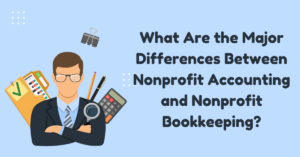Effective bookkeeping is essential in the world of nonprofit organizations, where every dollar goes toward a worthy purpose. This guide dives into the specifics of bookkeeping for nonprofit organizations, examining the special factors to take into account, how they differ from their for-profit competitors, and how outsourced accounting services function in this niche market.
Understanding Nonprofit Accounting:
The fundamental concepts of nonprofit accounting are management, accountability, and transparency. Nonprofit organizations allocate their resources to a mission, in contrast to for-profit businesses that are driven by shareholder profit. This unique goal influences the financial environment and calls for a specialist approach to accounting.
What is Nonprofit Bookkeeping?
The systematic documentation and arrangement of financial transactions for nonprofit organizations guarantee accurate and honest financial reporting. It entails keeping accurate records of donations, grants, and program-related activities in addition to tracking income and spending. Giving stakeholders a thorough understanding of the organization’s financial health is the ultimate objective.
How Is Nonprofit Bookkeeping Different from For-Profit Bookkeeping?
While the fundamental principles of bookkeeping remain consistent across sectors, the key differences lie in the objectives and the nature of financial transactions. For-profits are driven by profitability, focusing on revenue and profit margins. Nonprofits, on the other hand, prioritize accountability to donors and regulatory bodies, emphasizing the allocation of funds to the organization’s mission.
Nonprofit bookkeeping often involves tracking restricted and unrestricted funds separately. Donations may come with restrictions on how the funds can be used, requiring meticulous tracking to ensure compliance. Additionally, the focus on grant management and program-specific accounting sets nonprofit bookkeeping apart from its for-profit counterpart.
What Are the Major Differences Between Nonprofit Accounting and Nonprofit Bookkeeping?
While closely related, accounting and bookkeeping for nonprofits serve distinct purposes. Nonprofit bookkeeping is the day-to-day recording and classification of financial transactions, maintaining a clear and accurate financial trail. Nonprofit accounting, on the other hand, encompasses a broader scope, including financial analysis, budgeting, and strategic financial planning.
Accounting for nonprofits involves creating comprehensive financial statements, such as the statement of activities, statement of financial position, and statement of cash flows. These statements provide a holistic view of the organization’s financial health, aiding in decision-making and demonstrating accountability to stakeholders.
Outsourced Accounting Services for Nonprofits: A Strategic Move:
The complexity of nonprofit bookkeeping often prompts organizations to seek professional assistance. Outsourced accounting services can provide nonprofits with the expertise needed to navigate the intricacies of their financial management. This strategic move allows organizations to focus on their mission while ensuring compliance with regulatory requirements.
Outsourced accounting services bring a wealth of experience and specialized knowledge to the table. Professionals well-versed in nonprofit financial management can streamline processes, enhance reporting accuracy, and provide valuable insights for strategic decision-making. This proactive approach to financial stewardship can contribute significantly to the long-term sustainability of nonprofit organizations.
The Specialty of Ceptrum: Providing a Client Portal:
Ceptrum, a leader in outsourced accounting services, offers a unique advantage to nonprofits with its client portal. This secure online platform facilitates seamless communication and collaboration between the nonprofit and the accounting professionals at Ceptrum.
The client portal enhances transparency, allowing real-time access to financial reports, transaction details, and other critical information. This feature not only fosters a collaborative relationship but also provides nonprofits with the confidence that their financial data is secure and easily accessible.
Navigating the Regulatory Landscape:
Nonprofit organizations are subject to specific regulatory requirements, and compliance is paramount. Outsourced accounting services can help nonprofits navigate the complex regulatory landscape, ensuring adherence to reporting standards, tax regulations, and donor requirements.
By leveraging the expertise of professionals familiar with nonprofit regulations, organizations can mitigate the risk of non-compliance and focus on their core mission. This strategic partnership allows nonprofits to allocate resources efficiently, balancing financial stewardship with their commitment to creating a positive impact.
Conclusion:
Nonprofit bookkeeping is a unique endeavor that extends beyond standard accounting procedures. Because they are committed to their mission, nonprofit organizations need careful financial management that fits their specific goals and legal requirements. Leaders in the field, like Ceptrum, who provide outsourced accounting services, provide a calculated response to the challenges involved in managing the finances of nonprofit organizations.
For nonprofit organizations seeking to change the world, efficient bookkeeping becomes essential to their mission. Nonprofits may confidently navigate the financial tides and ensure a sustainable and beneficial future by grasping the subtleties of nonprofit accounting, recognizing the distinctions in bookkeeping for nonprofits and for-profits, and embracing the support of outsourced accounting services. Learn More.
Read More:
How Accounting outsourcing can streamline financial reporting







